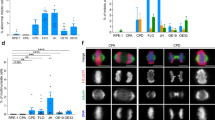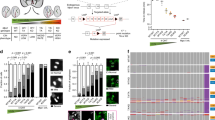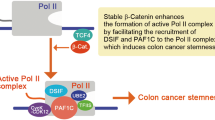Abstract
Adenomatous polyposis coli (APC/Apc) gene encodes a key tumor suppressor whose mutations activate β-catenin/T-cell factor (TCF)-mediated transcription (canonical Wnt signaling). Here, we show that Wnt signaling can cause chromosomal instability (CIN). As an indicator of CIN, we scored anaphase bridge index (ABI) in mouse polyps and ES cells where Wnt signaling was activated by Apc or β-catenin mutations. We found three to nine times higher ABI than in wild-type controls. Furthermore, karyotype analysis confirmed that the Wnt signal-activated ES cells produced new chromosomal aberrations at higher rates; hence CIN. Consistently, expression of dominant-negative TCFs in these cells reduced their ABI. We also found that Wnt signal activation increased phosphorylation of Cdc2 (Cdk1) that inhibited its activity, and suppressed apoptosis upon exposure of the cells to nocodazole or colcemid. The data suggest that Wnt signaling stimulates the cells to escape from mitotic arrest and apoptosis, resulting in CIN. In human gastric cancer tissues with nuclear β-catenin, ABI was significantly higher than in those without. These results collectively indicate that β-catenin/TCF-mediated transcription itself increases CIN through dysregulation of G2/M progression.
This is a preview of subscription content, access via your institution
Access options
Subscribe to this journal
Receive 50 print issues and online access
$259.00 per year
only $5.18 per issue
Buy this article
- Purchase on Springer Link
- Instant access to full article PDF
Prices may be subject to local taxes which are calculated during checkout





Similar content being viewed by others
References
Aoki K, Tamai Y, Horiike S, Oshima M, Taketo MM . (2003). Colonic polyposis caused by mTOR-mediated chromosomal instability in Apc+/Δ716Cdx2+/– compound mutant mice. Nat Genet 35: 323–330.
Botrugno OA, Fayard E, Annicotte JS, Haby C, Brennan T, Wendling O et al. (2004). Synergy between LRH-1 and β-catenin induces G1 cyclin-mediated cell proliferation. Mol Cell 15: 499–509.
Cahill DP, Lengauer C, Yu J, Riggins GJ, Willson JKV, Markowitz SD et al. (1998). Mutations of mitotic checkpoint genes in human cancers. Nature 392: 300–303.
Danesi DT, Sapno M, Fabiano A, Altavista P, Pasqualetti P, Toscano MG et al. (2000). Flow cytometric DNA ploidy, p53, PCNA, and c-erbB-2 protein expressions as predictors of survival in surgically resected gastric cancer patients. Cytometry 42: 27–34.
Dikovskaya D, Newton IP, Näthke IS . (2004). The adenomatous polyposis coli protein is required for the formation of robust spindles formed in CSF Xenopus extracts. Mol Cell Biol 15: 2978–2991.
Fodde R, Kuipers J, Rosenberg C, Smits R, Kielman M, Gaspar C et al. (2001). Mutations in the APC tumour suppressor gene cause chromosomal instability. Nat Cell Biol 3: 433–438.
Giles RH, van Es JH, Clevers H . (2003). Caught in a Wnt storm: Wnt signaling in cancer. Biophys Biochim Acta 1653: 1–24.
Gisselsson D . (2003). Chromosomal instability in cancer: how, when, and why? Adv Cancer Res 87: 1–29.
Gisselsson D, Pettersson L, Höglund M, Heidenblad M, Gorunova L, Wiegant J et al. (2000). Chromosomal breakage-fusion-bridge events cause genetic intratumor heterogeneity. Proc Natl Acad Sci USA 97: 5357–5362.
Green RA, Kaplan KB . (2004). Chromosome instability in colorectal tumor cells is associated with defects in microtubule plus-end attachments caused by a dominant mutation in APC. J Cell Biol 163: 949–961.
Harada N, Tamai Y, Ishikawa T, Sauer B, Takaku K, Oshima M et al. (1999). Intestinal polyposis in mice with a dominant stable mutation of the β-catenin gene. EMBO J 18: 5931–5942.
He TC, Sparks AB, Rago C, Hermeking H, Zawel L, da Costa LT et al. (1998). Identification of c-MYC as a target of the APC pathway. Science 281: 1509–1512.
Homfray TFR, Cottrell SE, Liyas M, Rowan A, Talbot IC, Bodmer WF et al. (1998). Defects in mismatch repair occur after APC mutations in the pathogenesis of sporadic colorectal tumors. Hum Mutat 11: 114–120.
Hsieh CL . (1997). Basic cytogenetic techniques: culture, slidemaking and banding. In: Celis JE (eds). Cell Biology: A Laboratory Handbook, 2nd edn. Academic Press: New York. pp 391–396.
Ishikawa T, Tamai Y, Li Q, Oshima M, Taketo MM . (2003). Requirement for tumor suppressor Apc in the morphogenesis of anterior and ventral mouse embryo. Dev Biol 253: 230–246.
Kaplan KB, Burds AA, Swedlow JR, Bekir SS, Sorger PK, Nathke IS . (2001). A role for the adenomatous polyposis coli protein in chromosome segregation. Nat Cell Biol 3: 429–432.
Kielman MF, Rindapaa M, Gaspar C, van Poppel N, Breukel C, van Leeuwen S et al. (2002). Apc modulates embryonic stem-cell differentiation by controlling the dosage of β-catenin signaling. Nat Genet 32: 594–605.
Kolodner RD, Putnam CD, Myung K . (2002). Maintenance of genome stability in Saccharomyces cerevisiae. Science 297: 552–557.
Konishi Y, Lehtinen M, Donovan N, Bonni A . (2002). Cdc2 phosphorylation of BAD links the cell cycle to the cell death machinery. Mol Cell 9: 1005–1016.
Korinek V, Barker N, Morin PJ, van Wichen D, de Weger R, Kinzler KW et al. (1997). Constitutive transcriptional activation by a β-catenin-Tcf complex in APC–/– colon carcinoma. Science 275: 1784–1787.
Li Q, Ishikawa T, Oshima M, Taketo MM . (2005). The threshold level of adenomatous polyposis coli protein for mouse intestinal tumorigenesis. Cancer Res 65: 8622–8627.
McCartney BM, Price MH, Webb R, Hayden M, Holot L, Zhou M et al. (2006). Testing hypotheses for the functions of APC family proteins using null and truncation alleles in Drosophila. Development 133: 2407–2418.
Michel LS, Liberal V, Chatterjee A, Kirchwegger R, Pasche B, Gerald W et al. (2001). MAD2 haplo-insufficiency causes premature anaphase and chromosome instablitiy in mammalian cells. Nature 409: 355–359.
Mizoshita T, Tsukamoto T, Nakanishi H, Inada K, Ogasawara N, Joh T et al. (2003). Expression of Cdx2 and the phenotype of advanced gastric cancers: relationship with prognosis. J Cancer Clin Oncol 129: 727–734.
Oshima M, Oshima H, Kitagawa K, Kobayashi M, Itakura C, Taketo M . (1995). Loss of Apc heterozygosity and abnormal tissue building in nascent intestinal polyps in mice carrying a truncation Apc gene. Proc Natl Acad Sci USA 92: 4482–4486.
Rajagopalan H, Jallepalli PV, Rago C, Velculescu VE, Kinzler KW, Vogelstein B et al. (2004). Inactivation of hCDC4 can cause chromosomal instability. Nature 428: 77–81.
Rajagopalan H, Lengauer C . (2004). Aneuploidy and cancer. Nature 432: 338–341.
Rudolph KL, Millard M, Bosenberg MW, DePinho RA . (2001). Telomere dysfunction and evolution of intestinal carcinoma in mice and humans. Nat Genet 28: 155–159.
Sekiya T, Adachi S, Kohu K, Yamada T, Higuchi O, Furukawa Y et al. (2004). Identification of BMP and activin membrane-bound inhibitor (BAMBI), an inhibitor of transforming growth factor-β signaling, as a target of the β-catenin pathway in colorectal tumor cells. J Biol Chem 279: 6840–6846.
Sekiya T, Nakamura T, Kazuki Y, Oshimura M, Kohu K, Tago K et al. (2002). Overexpression of Icat induces G2 arrest and cell death in tumor cell mutants for Adenomatous polposis coli, β-catenin, or axin. Cancer Res 62: 3322–3326.
Seno H, Oshima M, Taniguchi M, Usami K, Ishikawa T, Chiba T et al. (2002). CDX2 expression in the stomach with intestinal metaplasia and intestinal-type cancer: prognostic implications. Int J Oncol 21: 769–774.
Shih IM, Zhou W, Goodman SN, Lengauer C, Kinzler KW, Vogelstein B . (2001). Evidence that genetic instability occurs at an early stage of colorectal tumorigenesis. Cancer Res 61: 818–822.
Shin HJ, Baek KH, Jeon AH, Park MT, Lee SJ, Kang CM et al. (2003). Dual roles of human BubR1, a mitotic checkpoint kinase, in the monitoring of chromosomal instability. Cancer Cell 4: 483–497.
Sieber OM, Heinimann K, Tomlinson IP . (2003). Genomic instability – the engine of tumorigenesis? Nat Rev Cancer 3: 701–708.
Stewenius Y, Gorunova L, Jonson T, Larsson N, Hoglund M, Mandahl N et al. (2005). Structural and numerical chromosome changes in colon cancer develop through telomere-mediated anaphase bridges, not through mitotic multipolarity. Proc Natl Acad Sci USA 102: 5541–5546.
Taketo MM . (2006). Mouse models of gastrointestinal tumors. Cancer Sci 97: 355–361.
Tan M, Jing T, Lan KH, Neal CL, Li P, Lee S et al. (2002). Phosphorylation on tyrosine-15 of p34Cdc2 by ErbB2 inhibits p34Cdc2 activation and is involved in resistance to Taxol-induced apoptosis. Mol Cell 9: 993–1004.
Tetsu O, McCormick F . (1999). β-Catenin regulates expression of cyclin D1 in colon carcinoma cells. Nature 398: 422–426.
Tighe A, Johnson VL, Taylor SS . (2004). Truncating APC mutations have dominant effects on proliferation, spindle checkpoint control, survival and chromosome stability. J Cell Sci 117: 6339–6353.
Triezenberg SJ, Kingsbury RC, McKnight SL . (1988). Functional dissection of VP16, the trans-activator of herpes simplex virus immediate early gene expression. Genes Dev 2: 718–729.
Ushijima T, Sasako M . (2004). Focus on gastric cancer. Cancer Cell 5: 121–125.
van de Wetering M, Sancho E, Verweij C, de Lau W, Oving I, Hurlstone A et al. (2002). The β-catenin/TCF-4 complex imposes a crypt progenitor phenotype on colorectal cancer cells. Cell 111: 241–250.
Acknowledgements
We thank M Maekawa for excellent technical assistance, Dr M Sonoshita for the retrovirus method, and Dr A Shimizu for the flow cytometry service. We also thank Drs S Yamashita, E Sonoda and S Takeda for fruitful discussions, and Dr J Moneypenny for comments on the paper. We thank Drs H Clevers (Utrecht) and T Akiyama (Tokyo) for providing us the dominant-negative TCF constructs, and Dr P Vogt (San Diego) for the TCF4-VP16 constructs. This work was supported by grants from the Ministry of Education, Culture, Sports, Science and Technology, Japan, and from Sagawa Cancer Research Fund. KA is a 21st Century COE Program postdoctoral fellow at Graduate School of Medicine, Kyoto University.
Author information
Authors and Affiliations
Corresponding author
Additional information
Supplementary Information accompanies the paper on the Oncogene website (http://www.nature.com/onc).
Supplementary information
Rights and permissions
About this article
Cite this article
Aoki, K., Aoki, M., Sugai, M. et al. Chromosomal instability by β-catenin/TCF transcription in APC or β-catenin mutant cells. Oncogene 26, 3511–3520 (2007). https://doi.org/10.1038/sj.onc.1210141
Received:
Revised:
Accepted:
Published:
Issue Date:
DOI: https://doi.org/10.1038/sj.onc.1210141
Keywords
This article is cited by
-
Wnts and the hallmarks of cancer
Cancer and Metastasis Reviews (2020)
-
Secreted Frizzled-Related Protein 4 (SFRP4) Is an Independent Prognostic Marker in Prostate Cancers Lacking TMPRSS2: ERG Fusions
Pathology & Oncology Research (2020)
-
Multiple oncogenic roles of nuclear β-catenin
Journal of Biosciences (2017)
-
Analysis of APC mutation in human ameloblastoma and clinical significance
SpringerPlus (2016)
-
Apc and p53 interaction in DNA damage and genomic instability in hepatocytes
Oncogene (2015)



